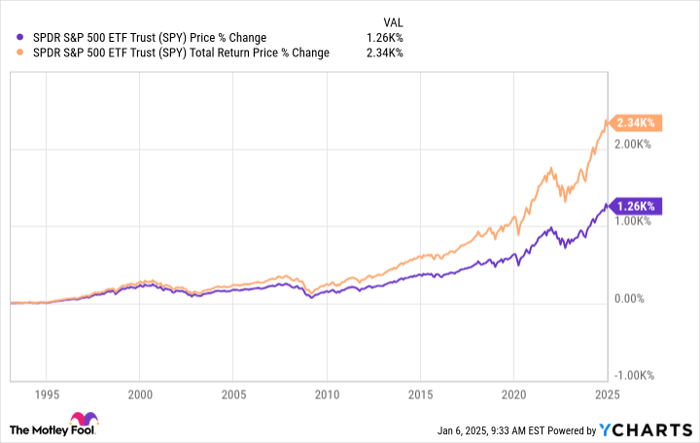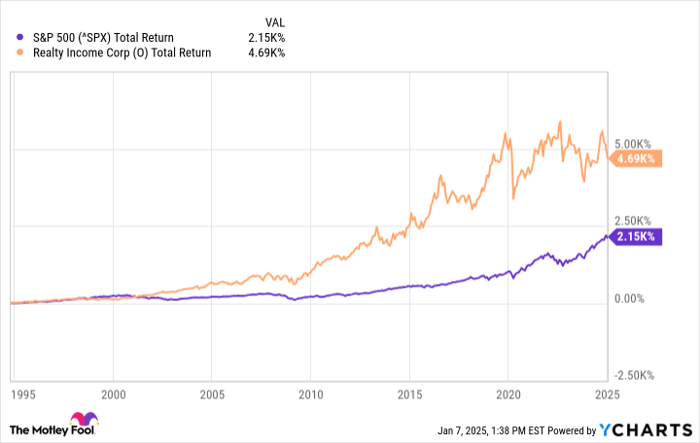When a lot of investors think about building wealth, their thoughts tend to go toward capital appreciation. That's understandable, but it misses the full picture when it comes to investing. Dividends, particularly if you reinvest them, can help you build wealth slowly (and easily) over time.
This is why investors would be wise to take a closer look at high-yield stocks like Realty Income (NYSE: O) and Vici Properties (NYSE: VICI) right now. Both have characteristics that make them easy wealth builders. Here's why.
Start Your Mornings Smarter! Wake up with Breakfast news in your inbox every market day. Sign Up For Free »
The power of dividend reinvestment
Since early 1993, when the SPDR S&P 500 ETF Trust (NYSEMKT: SPY) was created, the share price of the first exchange-traded fund (ETF) has risen roughly 1,250%. That's a pretty impressive number. But that's just the share price gain; it has also paid dividends over that entire span.
Add in those dividends to look at total return (which assumes dividend reinvestment), and the ETF's return rises to more than 2,300%. Think about that for a second.
If you don't need the dividends your portfolio throws off, reinvesting the dividends can lead to a huge improvement in your total return. And all you have to do is sit back and collect the dividend checks. (OK, you have to reinvest the dividend checks, which most of the time requires simply clicking a box on your broker's website.)
That's a pretty easy way to build wealth, since the real goal is to find good companies that have reliable dividend histories. You can make it even easier if you forgo the hot sectors and look at high-yielders from temporary out-of-favor stocks. That's exactly what Realty Income and Vici Properties are today.
Realty Income is "The Monthly Dividend Company"
Realty Income's dividend yield is about 6%. It has increased its dividend annually for three decades at an average annualized rate of just over 4%. Put those two numbers together, and you get 10%, which is around the total return investors expect from the broader market. That dividend yield is also near its highest level of the past decade, suggesting this high-yield stock is on sale today.
But there's a lot to like about Realty Income, even if the market is broadly downbeat on the stock right now. For example, it has shown an incredible commitment to growing its dividend, even going so far as to trademark the name "The Monthly Dividend Company."
Realty Income has an investment-grade-rated balance sheet. Its portfolio spans across the United States and Europe. The business invests in a broad range of assets, largely retail and industrial properties, but also an increasing list of other areas, like data centers and casinos.
Realty Income isn't going to excite you, but if you can afford to reinvest the lofty dividends this real estate investment trust (REIT) throws off, it will help you slowly and steadily build wealth over time. In fact, over the long term, Realty income's total return has actually more than doubled that of the S&P 500 (SNPINDEX: ^GSPC)!
Data by YCharts.
Vici Properties is young, but the runway is long
While Realty Income has a 30-year track record of dividend increases, Vici Properties' track record is only about seven years long. That's a function of the fact that Vici is a much younger REIT. That probably isn't a good reason to avoid the stock, because the average remaining lease length of Vici's portfolio is a huge 41 years. And roughly 90% of its rents are covered by leases that include inflation-linked rent increases.
That means that Vici's rent roll will keep heading higher over time without the addition of any new properties to the portfolio. But that isn't the goal. Vici Properties, which is heavily focused on casino assets, is increasingly looking to add other experiential assets to its list of holdings. Given the investment-grade-rated balance sheet and solid casino portfolio, there's no particular reason to think it won't be successful in this effort.
In this case, you can take the current yield of around 5.9% and add in dividend growth of 7% annualized since the REIT started paying a dividend in 2018. That brings you to nearly 13%, which is probably a bit too high a figure to hold the company to over the longer term.
But 10% or so seems pretty reasonable since the dividend gets you more than halfway to that figure. Not a bad outcome, and all you need to do is set up dividend reinvestment one time to benefit from the compounding available from that lofty yield.
Slow and boring can be truly exciting, given enough time
Neither Realty Income nor Vici Properties are the kinds of stocks you'll brag about at dinner parties. But they are the kinds of slow and reliable high-yielders that build wealth over time. And they do it the easy way, by paying you well for sticking around through good and bad markets. Sure, these two REITs are boring compared to artificial intelligence (AI) stocks and crypto, but that's actually a big part of the allure for those who like to sleep well at night.
Don’t miss this second chance at a potentially lucrative opportunity
Ever feel like you missed the boat in buying the most successful stocks? Then you’ll want to hear this.
On rare occasions, our expert team of analysts issues a “Double Down” stock recommendation for companies that they think are about to pop. If you’re worried you’ve already missed your chance to invest, now is the best time to buy before it’s too late. And the numbers speak for themselves:
- Nvidia: if you invested $1,000 when we doubled down in 2009, you’d have $363,385!*
- Apple: if you invested $1,000 when we doubled down in 2008, you’d have $45,870!*
- Netflix: if you invested $1,000 when we doubled down in 2004, you’d have $474,140!*
Right now, we’re issuing “Double Down” alerts for three incredible companies, and there may not be another chance like this anytime soon.
*Stock Advisor returns as of January 6, 2025
Reuben Gregg Brewer has positions in Realty Income. The Motley Fool has positions in and recommends Realty Income. The Motley Fool recommends Vici Properties. The Motley Fool has a disclosure policy.
The views and opinions expressed herein are the views and opinions of the author and do not necessarily reflect those of Nasdaq, Inc.




